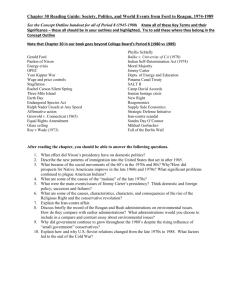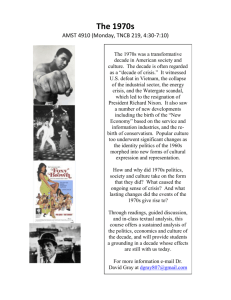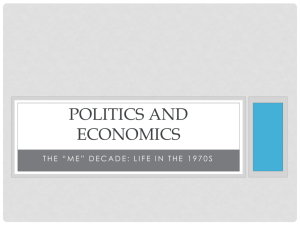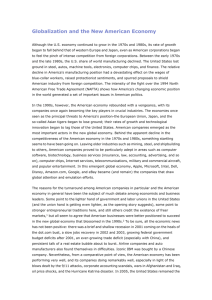HIST 343 - Oberlin College
advertisement
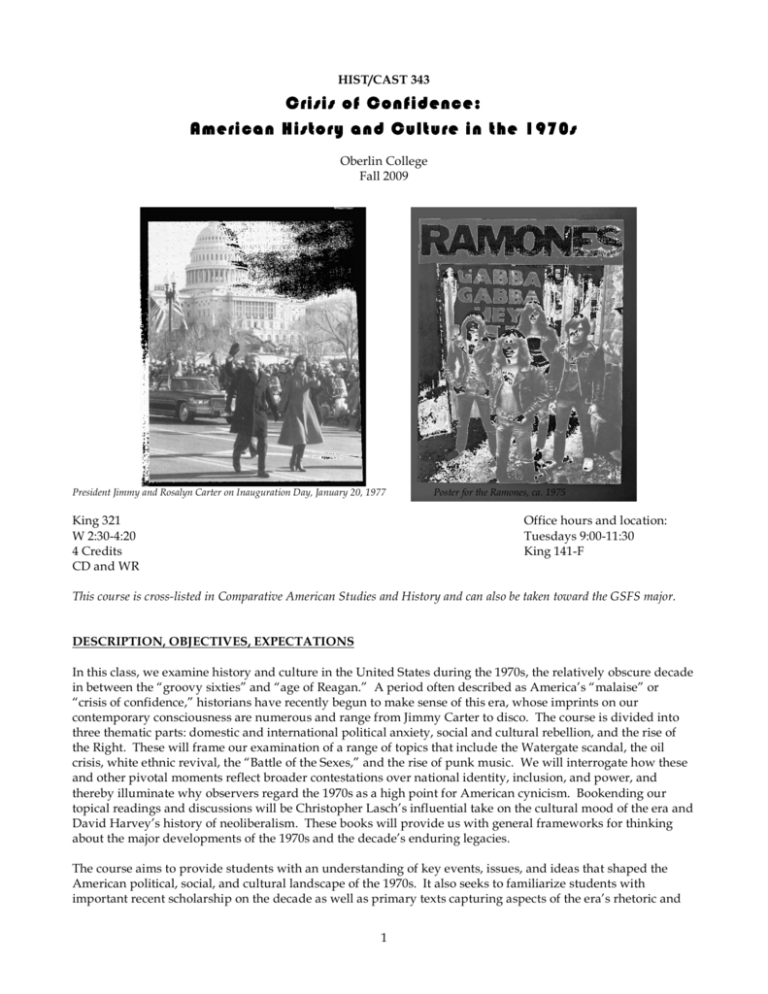
HIST/CAST 343 Crisis of Confidence: Ameri can History and Culture in the 1970s Oberlin College Fall 2009 President Jimmy and Rosalyn Carter on Inauguration Day, January 20, 1977 King 321 W 2:30-4:20 4 Credits CD and WR Poster for the Ramones, ca. 1975 Office hours and location: Tuesdays 9:00-11:30 King 141-F This course is cross-listed in Comparative American Studies and History and can also be taken toward the GSFS major. DESCRIPTION, OBJECTIVES, EXPECTATIONS In this class, we examine history and culture in the United States during the 1970s, the relatively obscure decade in between the “groovy sixties” and “age of Reagan.” A period often described as America’s “malaise” or “crisis of confidence,” historians have recently begun to make sense of this era, whose imprints on our contemporary consciousness are numerous and range from Jimmy Carter to disco. The course is divided into three thematic parts: domestic and international political anxiety, social and cultural rebellion, and the rise of the Right. These will frame our examination of a range of topics that include the Watergate scandal, the oil crisis, white ethnic revival, the “Battle of the Sexes,” and the rise of punk music. We will interrogate how these and other pivotal moments reflect broader contestations over national identity, inclusion, and power, and thereby illuminate why observers regard the 1970s as a high point for American cynicism. Bookending our topical readings and discussions will be Christopher Lasch’s influential take on the cultural mood of the era and David Harvey’s history of neoliberalism. These books will provide us with general frameworks for thinking about the major developments of the 1970s and the decade’s enduring legacies. The course aims to provide students with an understanding of key events, issues, and ideas that shaped the American political, social, and cultural landscape of the 1970s. It also seeks to familiarize students with important recent scholarship on the decade as well as primary texts capturing aspects of the era’s rhetoric and 1 mood. In terms of analytical tools, the course seeks to strengthen and hone skills in critical reading, effective oral communication, clear writing, and historical thinking. This class is an advanced reading seminar, and though there are no formal prerequisites, it is recommended that you have taken some college-level modern U.S. history courses and can manage large reading loads, as we will be reading roughly one book per week. Our meetings will be largely discussion-driven, with the emphasis on closely analyzing the assigned texts and relating them to broader concerns, trends, and problems in recent American history. You are expected to complete the assigned readings before our meetings, submit your work in a timely manner, and come to class prepared and on time. While you should think of our weekly meetings as forums for open discussion in which to share ideas with, debate and learn from one other, always do so in a respectful and courteous manner. Finally, if you have any problems meeting these expectations or any course requirements, do speak with me as soon as possible, as I may be unable to assist you in a last minute situation. REQUIRED TEXTS (available at Oberlin Bookstore) Stephane Dunn, Baad Bitches and Sassy Supermamas: Black Power Action Films (University of Illinois Press, 2008) David Farber, Taken Hostage: The Iran Hostage Crisis and America’s First Encounter with Radical Islam (Princeton, 2006) Ronald Formisano, Boston Against Busing: Race, Class and Ethnicity in the 1960s and 1970s (UNC, 2003) H. Bruce Franklin, Vietnam and Other American Fantasies (U Mass Press, 2000) William Graebner, Patty’s Got a Gun: Patricia Hearst in 1970s America (University of Chicago Press, 2008) David Harvey, A Brief History of Neoliberalism (Oxford, 2005) Matthew Jacobson, Roots Too: White Ethnic Revival in Post-Civil Rights America (Harvard, 2008) Christopher Lasch, The Culture of Narcissism: American Life in an Age of Diminishing Expectations (Norton 1991) Bethany Moreton, To Serve God and Walmart: The Making of Christian Free Enterprise (Harvard, 2009) Bob Woodward and Carl Bernstein, All The President’s Men (Pocket, 2005) ASSIGNMENTS AND GRADING Final grades will be based on a 200-point scale 193 – 200 186 - 192 180 - 185 174 - 179 167 - 173 160 - 166 A+ A AB+ B B- 153 – 159 147 – 152 140 – 146 120 – 139 119 & below C+ C CD F Final grades will be based on the following: Attendance and participation (25%). In a small, weekly seminar such as this class, each student’s attendance and participation is vital to the course’s success. Do show your respect for your classmates and the instructor by arriving on time and prepared (we start at 2:30!). Any unexcused absence will result in a deduction of 6 points (approximately 1/3 of a grade) from your final grade; however you cannot pass the class if you miss more than two classes. Excessive tardiness and disruptiveness will likewise negatively affect your grade. On participation, you should be a thoughtful discussant as well as attentive listener. Above all, I am looking for you to demonstrate that you have read and thought critically about the reading, are engaged with the topic at hand, are respectful of your classmates’ ideas and opinions, and are reflective in your comments. If for any reason you have difficulty with class discussion, see me as soon as possible. I will give you a score and feedback on your participation during Weeks 7 and 15, but you may also consult with me in office hours if you wish to know how you are doing in this area. Blackboard (10%). To encourage critical thinking and facilitate class discussion, you are to post responses to the readings on Blackboard by 8pm the night before class, TEN times during the semester. Approach this assignment as a space to express your initial thoughts about the reading and as a preview for class discussion. 2 Your postings should address the following: 1. Why is the topic important and what is the book’s argument? How does the author support it (evidence, interpretations, etc.)? 2. Is the interpretation and presentation convincing? Why/why not? 3. What additional questions does the book raise that you’d like to discuss? Students doing presentations should consult these postings to shape their remarks and questions. Each post counts for two points and while these are not graded, posts that fail to make substantive comments will not receive credit. Presentation and discussion facilitation (10%). Once during the semester you and a partner (there will be one group of three) will be in charge of facilitating discussion. I will, of course, assist and direct as needed, but for approximately the first 30 minutes of our meeting, you are responsible for the design and structure of class. Though you may choose the format, be sure to cover the following: explain/discuss the historical significance of the book’s topic, review and assess its argument, closely discuss example(s) from the book. You will be graded on the thoughtfulness of your lesson plan/presentation, clarity of your remarks, demonstrated mastery of the text and historical issues, and effectiveness in engaging the rest of the class. Plan ahead and get creative with this task. You might consider incorporating debate, small group discussion, multimedia, and/or other materials and exercises. What you should absolutely NOT do is lecture or talk at the class for 45 minutes. Though you are not required to, I strongly encourage you to touch base with me in office hours to discuss your ideas. Critical reviews (30%). You will write four book reviews (4-5 pages) in the course of the semester on any of the assigned books, except All the President’s Men. These are aimed at facilitating critical reading and writing about American history, and should be similar in style and content to book reviews you would see in scholarly history journals. These reviews will be graded on your ability to clearly and concisely articulate the author’s argument; your success in critically analyzing and evaluating the author’s argument, with attention to his/her evidence, methods, and interpretations; and your skill in locating this analysis within the larger discussions and themes of this class. All papers should be clearly presented, logically organized, and free of spelling and grammatical errors. These papers are worth 15 points and constitute 30% of your grade. Please note that you can only write on entire books, not sets of articles. There are five possible deadlines for these four assignments (you may not turn in more than one at a time) so you have some flexibility on due dates. However do plan ahead and stay on top of your work to ensure that you have completed your four by December 9. The rolling deadlines on these assignments are: Sept. 16, Oct. 7, Oct. 28, Nov. 11, and Dec. 9. Final paper (25%). To integrate your skills in analyzing history texts and reading of primary material, you will write a final paper (10-12 pages) on any topic significant to American history in the 1970s that draws upon at least two book-length history monographs and a set of primary sources. For your secondary sources, you can substitute articles for books (4-5 articles = a book), and primary sources may include articles, films, and novels. More details on this assignment will be given in class. A 1-2 page prospectus outlining your paper and preliminary sources is due November 11 and the final paper is due December 18. Grades on written work are based on displayed intellectual content, originality of thought, mastery of materials, and quality of expression. For all written assignments you must turn in hard copies. I do not give extensions and any late assignments will be graded down 1/3 of a grade for each day late. HONOR CODE By enrolling in this class, you are agreeing to abide by Oberlin’s Honor Code/System. This means that you will refrain from plagiarizing and cheating, and that on all assignments you will write and sign the honor pledge (“I affirm that I have adhered to the Honor Code in the assignment”). Failure to adhere to the Honor Code may result in a grade penalty, withholding of a grade, and/or reporting to the Student Honor Committee. Oberlin’s honor policy can be accessed at www.oberlin.edu/stuorg/shc/. SPECIAL NEEDS I will make every effort to accommodate the needs of students with learning, physical, and/or other disabilities. Do see me as soon as possible to discuss any modification that may be necessary. 3 OFFICE HOURS AND CONTACTING ME The best way to contact me is to come to office hours. I strongly encourage each of you to visit at least once during the term. I will do my best to respond to emails in a timely manner, but generally do not check email after 10:00PM. SEMESTER SCHEDULE INTRODUCTION AND THEMES WEEK 1 (Sept. 2): THE SIGNIFICANCE OF THE 1970s IN AMERICAN HISTORY WEEK 2 (Sept. 9): NARCISSISM AND MALAISE: THE PERSONALITY AND MOOD OF A DECADE Reading: Christopher Lasch, Culture of Narcissism, all except Chapters 5-6. DOMESTIC AND INTERNATIONAL ANXIETY WEEK 3 (Sept. 16): WATERGATE AND THE END OF AMERICAN INNOCENCE Reading: Bob Woodward and Carl Bernstein, All The President’s Men, all WEEK 4 (Sept. 23): WAR AND AMERICAN CULTURE Reading: Franklin, Vietnam and Other American Fantasies, all WEEK 5 (Sept. 30): OIL AND SCARCITY Reading: Bruce Schulman, “Jimmy Carter and the Crisis of Confidence,” Melani McAlister, “King Tut, Commodity Nationalism, and the Politics of Oil,” and Meg Jacobs, “The Conservative Struggle and the Energy Crisis” (Blackboard) WEEK 6 (Oct. 7): THE ORIGINS OF THE WAR ON TERRORISM Reading: Farber, Taken Hostage, all REBELLION AND ITS DISCONTENTS WEEK 7 (Oct. 14): THE HEARST SPECTACLE AND THE DEMISE OF THE NEW LEFT Reading: Graebner, Patty’s Got a Gun, all WEEK 8: FALL BREAK WEEK 9 (Oct. 28): FROM BLACK POWER TO BLAXPLOITATION Reading: Dunn, Baad Bitches and Sassy Supermamas, all WEEK 10 (Nov. 4): REBELLION AND REVOLUTION IN 1970s CULTURE Reading: Peter Braunstein, “Adults Only,” Bruce Schulman, “This Ain’t No Foolin’ Around,” Michael Nevin Willard, “Cutback” (Blackboard) BACKLASH AND AMERICA’S RIGHT TURN WEEK 11 (Nov. 11): UNBEARABLE WHITENESS? WHITE ETHNIC REVIVAL Reading: Jacobson, Roots Too, all except Chapter 7 Paper prospectus due 4 WEEK 12 (Nov. 18): THE POST-CIVIL RIGHTS STRUGGLES Reading: Formisano, Boston Against Busing, all (skim Chapters 2-3) WEEK 13 (Nov. 25): BATTLE OF THE SEXES: GENDER AND FAMILY VALUES Reading: Matthew Lassiter, “Inventing Family Values,” Beth Bailey, “She Can Bring Home the Bacon,” Marjorie Spruill, “Gender and America’s Right Turn” (Blackboard) WEEK 14 (Dec. 2): THE WAL-MART MOMENT: CHRISTIAN FREE ENTERPRISE Reading: Moretson, To Serve God and Wal-Mart, all LEGACIES OF THE 1970s WEEK 15 (Dec. 9): NEOLIBERALISM: A CONCEPT OF OUR TIMES Reading: Harvey, A Brief History of Neoliberalism, all Final Paper due Friday, December 18 by 4:00 PM outside my office at King 141-F **The contents of this syllabus are subject to change. I will notify you in class and via Blackboard of any updates. 5
